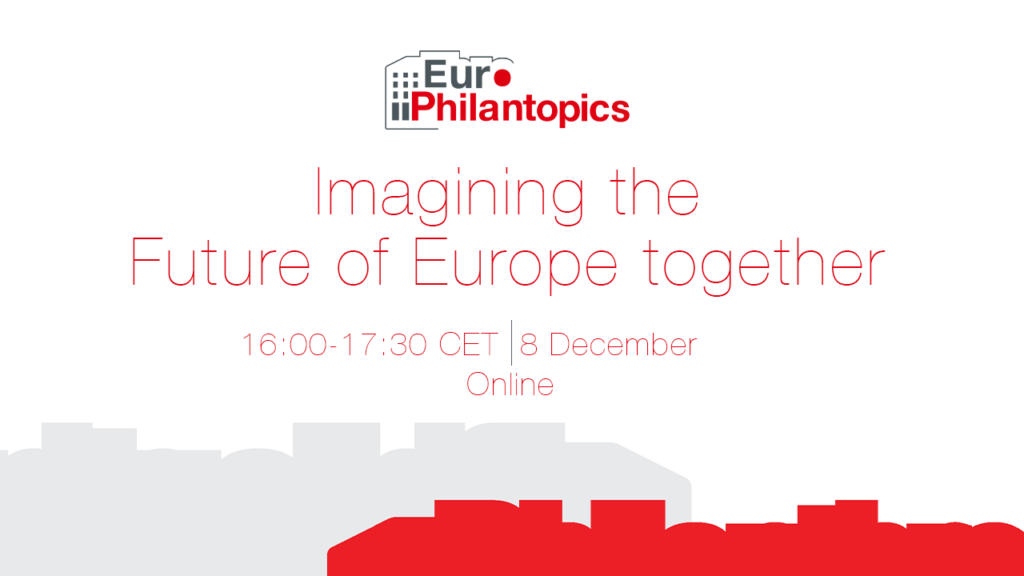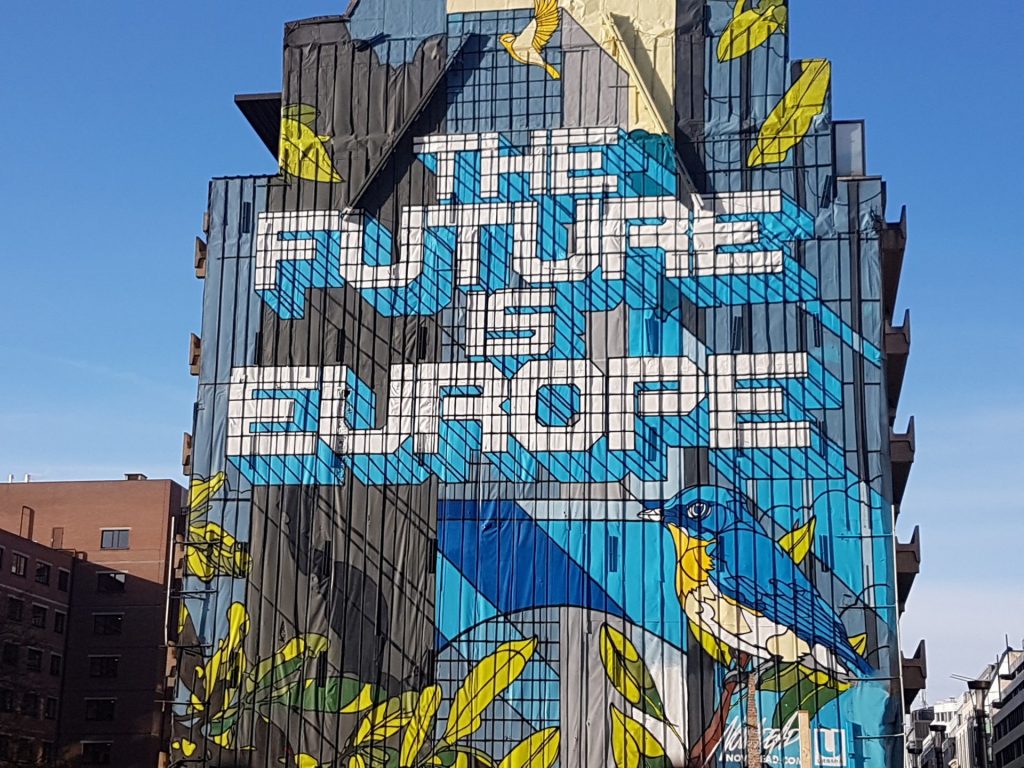Imagining the Future of Europe Together – EuroPhilantopics 2021
On 8 December, one day after the launch of Philea, the new European platform for philanthropy which brings together Dafne and EFC, we hosted the 2021 EuroPhilantopics conference.
This year’s conference, titled “Imagining the Future of Europe together” gathered representatives of foundations, national associations of foundations and representatives of the EU institutions. Following a keynote by European Commission Vice-President Margaritis Schinas, we discussed how to best unlock the potential for collaboration between philanthropy and the EU, and how to build meaningful cooperation for the future of Europe.

Setting the scene: the Social Economy Action Plan as new chapter for philanthropy
Delphine Moralis, the incoming Chief Executive Officer of Philea, opened the floor by noting that foundations are increasingly looking into partnering with EU institutions, and their diversity and wide reach makes them a relevant partner for policymakers. However, she highlighted that stumbling blocks to philanthropy’s contribution still exist, referring to the absence of a single market for philanthropy as an example.
The keynote speaker, European Commission Vice-President Margaritis Schinas, Commissioner for Promoting our European Way of Life, took note of the close links between his anthropocentric mission within the European Commission and philanthropy, which is about putting people first.
His message was clear: the adoption of the Social Economy Action Plan (SEAP) by the European Commission has included the key recommendations of our sector contribution to the consultation. The Social Economy Action Plan, which seeks to promote the wider social economy sector, will focus on three goals leading up to 2030:
- Create the right framework conditions for social economy and philanthropy to thrive;
- Open up opportunities for scaling up Social Economy (SE) entities;
- Improve the overall recognition of the SE sector and its potential.
Vice-President Schinas recognised that “Philanthropic organisations still face legal and tax limitations in taking full advantage of the single market and we address concerns with specific actions.”
He then set out the ways in which the European Commission intends to address the philanthropy sectors’ specific legal and tax concerns, notably through the following initiatives:
- – Clarifying rules on the existing situation of cross-border donations with guidance to Member States on how the implementation of non-discrimination principle should be improved;
- – Proposing to the Council a recommendation to develop SE framework conditions by 2023 by adapting legal frameworks to the needs of SE entities, including legal classification of philanthropic organisations;
- – Perform a specific study on philanthropic donations in the EU in an effort to improve the public understanding of the existing size and scope of philanthropy and identify areas with development potential;
- – Create better links and synergies between philanthropic donations and mission-related investments, by assessing the launch of co-investment mechanisms around targeted mission areas in political priorities that matter to the EU. The first steps have been taken on this in the context of the InvestEU programme.
He closed his keynote intervention by noting that the adoption of the SEAP will be the beginning of a new chapter in the recognition and development of SE and philanthropy. The SEAP outlines key next steps, including exploring how we can reinforce the entities present in this work, as well as create the conditions to facilitate newcomers in philanthropy, and how we can combine financial resources to achieve greater scale and bigger impact. The Vice-President invited the philanthropy infrastructure to continue the cooperation, as well as providing input and supporting the implementation phase of the Action Plan.
Following his promising intervention, Vice-President Schinas was joined by incoming Philea President Angel Font and Vice-President Carola Carazzone who engaged in a dialogue with him.
Carola Carazzone highlighted the recently published Comparative Highlights of Foundation Law, which lays out some of the key barriers for foundations operating in Europe. Responding to these concerns, Vice-President Schinas pointed to the European Commission’s role as catalysts, which will help the philanthropic sector to operate in better conditions. In this regard, he positioned the SEAP as the operational document providing the opportunity to make philanthropy thrive.
Angel Font assured Margaritis Schinas that if the Commission provides the right tools to the sector in the coming years, the sector’s impact will be important. He then asked the Vice-President about the key societal issues where the philanthropy sector can play a key role in building a resilient Europe. Vice-President Schinas welcomed the joint direction to be taken by the Commission and philanthropy, especially in working towards integration, inclusion and fairness. Additionally, when it comes to Build Back Better, he sees a role for philanthropy to join the Commission in upskilling and reskilling efforts in light of the green and digital transitions.

Discussing collaboration around common priorities for the public good
Participants were then invited to join in-depth conversations around the following topics: (i) Democracy, rule of law and fundamental rights in a new light; (ii) If not now when – catalysing joint action on climate; (iii) Imagining a common European space for media and culture; (iv) Driving social inclusion and equality. Every topical room was accompanied by a policymaker, foundation representative and national association representative. Hanna Surmatz, Enabling Environment Manager, gathered feedback from each conversation.
On democracy, European Commission DG JUST Paul Nemitz noted that civil society is under pressure in Europe, due to a shrinking space for activity and financing. However, fundamental rights and the rule of law need a strong civil society. Hence the discussions called for more political engagement, which requires more structured and strategic dialogue with civil society. He also announced that DG JUST is about to publish a call for intermediaries acting as regranters and called on the philanthropy sector to engage with this initiative.
On climate, Benoit Miribel from the French Foundation Centre reported on the Philanthropy Coalition for Climate, which calls on all foundations to implement a climate lens throughout their operations. European Commission DG CLIMA’s Katarzyna Balucka-Debska highlighted the opportunities to engage with the EU Climate Pact as individuals, organisations and ecosystems.
Reporting back on culture, European Culture Foundation’s André Wilkens picked up on the SEAP and the need for both the Commission and the philanthropy sector to be innovative. He called for a move from programme to multi-annual funding arrangements, and overall, for more opportunities for cooperation, for instance in the form of joint funds.
For social inclusion, DG EMPL’s Miia Rossi-Gray noted that the Commission recognises the important role of foundations in the landscape of SE, as actors in their own right and as funders of the SE. As a representative of the lead service on SEAP, DG EMPL, she highlighted that the Commission is sending a clear signal that the work philanthropy does is important to the EU and that they work actively with the sector to support it.
The last session looked into research. There, Signe Ratso of DG RTD, noted that “philanthropic societies will have a lot to offer, particularly solutions to some of the innovation challenges, which will be better suited to be supported by philanthropy, since neither market nor policy can address them on their own.
The way forward: A new chapter and tangible collaboration
The closing panel was moderated by Ludwig Forrest of the King Baudouin Foundation, who was joined by DG GROW’s Ulla Engelmann, DG ECFIN’s Georgia Efremova, and Carola Carazzone, incoming Philea Vice-President.
Ulla Engelmann highlighted the potential of the SEAP for philanthropy and in particular the inclusion of a Social Economy transition pathway. She invited the philanthropy sector to take part in other transition pathways where philanthropy works towards common objectives, such as on cultural and creative industries, health or proximity.
Georgia Efremova provided some insights into ongoing conversations between DG ECFIN and philanthropy/foundations around joint mission areas to serve the common good together within the context of InvestEU. Tangible next steps were listed, including: a de-risking and alignment mechanism for foundations transitioning to MRI endowment; enabling mission critical investments; a collaborative and capacity building platform; and pooled grant funds to explore missions by impact entrepreneurs, which goes beyond InvestEU.
Carola Carazzone welcomed the increased understanding about philanthropy the policymakers have demonstrated throughout the event and over the past months. She highlighted that Philea is well-positioned to coordinate collaboration with the EU institutions on a wide range of topics, in addition to its role as guardian of the operating space for philanthropy. Indeed, there is the common goal of a single market for philanthropy, but also a need and willingness to explore new ways to co-grant and co-invest for public good.
Closing remarks were provided by Max von Abendroth, incoming Chief Strategy Officer of Philea. He warmly welcomed the concrete and tangible outcomes of this gathering: the clear commitment to work with philanthropy as never heard before; the InvestEU collaboration which is shaping up nicely; and the positioning of Philea as a central player to advance collaboration between policymakers and the philanthropy ecosystem.
